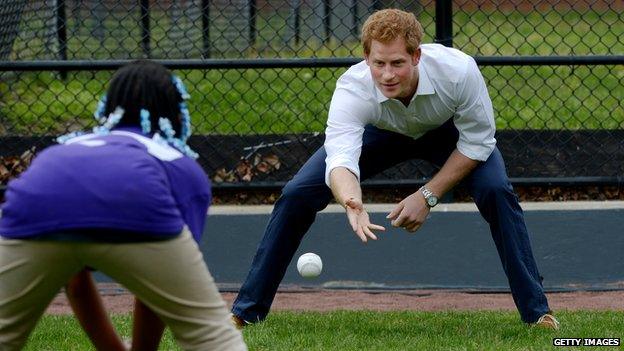Why isn't baseball more popular in the UK?
- Published

Prince Harry performed well while executing baseball drills during his latest US visit. But baseball is still not popular in the UK
While much of Europe has come to adopt baseball, money woes and apathy spell trouble for Team GB. Will it ever fully embrace the US pastime?
After decades as one of America's favourite sports, baseball has expanded its global profile. Now Europe has begun to make its mark on the international game.
But while the prospects for other European baseball teams have brightened, Team GB's have darkened considerably.
Money constraints and public apathy have created conditions that make it unlikely that the team will perform well at next year's European Baseball Championships - and that in turn will lead to more financial woes and even less of a public profile.
Though football now dominates the British sports landscape, baseball was at one time very popular.
Earlier this month, American baseball historian David Block discovered that the first recorded game of "Bass-Ball" took place in 1749 in Surrey, and featured the Prince of Wales as a player.
In 1918, a game between the US Navy and Army at Chelsea FC's Stamford Bridge stadium attracted 38,000 fans, including King George V.
After World War II, however, baseball's popularity in the UK declined, while the game began to gain popularity on the continent.
The presence of American troops in Italy and the Netherlands helped usher in the creation of strong domestic leagues as more and more Europeans came into contact with the national pastime.
Though European teams still trail baseball-mad nations like Japan, South Korea, the Dominican Republic, Cuba and Puerto Rico, they have recently begun to put their stamp on the international game.
At the 2013 World Baseball Classic (WBC), the Netherlands took a shocking fourth-place finish, beating Venezuela - the native country of Major League Baseball's reigning Triple Crown winner, Miguel Cabrera - Cuba, and even the United States.
Italy took seventh, but were eliminated only after losing consecutive one-run games to the two eventual finalists: Puerto Rico and the Dominican Republic.
Team GB, on the other hand, had to watch from home. In last September's qualifying tournament, they were eliminated after being blown out by both Germany and Canada.
It's not totally surprising: Italy and the Netherlands have very well-established professional leagues domestically, which have facilities to match.
Perhaps more importantly, both have plenty of New World connections to bolster their programme. In WBC play, Italy draws heavily from the US Italian-American population; the bulk of the national team is American-born.
The Netherlands have also benefited from the US immigrant community - their manager, Netherlands-born Bert Blyleven, became a Hall of Fame pitcher in Major League Baseball.
They also can pick from talent located in the Dutch Caribbean, specifically Aruba and Curacao, where baseball is popular.
That's not to say that Team GB does not have its own North American flavour. After appearing for Team GB last September, Michael Roth was called up by the Los Angeles Angels of Anaheim this spring, making him the first pitcher in the national team's history to play Major League Baseball.
But as a native of South Carolina with an English mother, he did not even realise he was eligible to play for Great Britain until British Baseball contacted him last year.
Given the choice between his Major League career and the international game… well, there is no choice, really.
"Will I ever pitch for [Team GB] again? I wouldn't rule it out at all," Roth says. "But hopefully my career in the US will take off, and I'm busy focusing on that for a while [so that] I'm not allowed to."
Whereas the Netherlands, Italy and Germany have the infrastructure to support a strong domestic league, Great Britain's top-flight teams will frequently play on fields with temporary outfield fencing and dugouts, and sometimes even without a backstop behind home plate.
It's a tough sell to dig up funding for upgrades.

Michael Roth is the only member of team GB to play professionally in the US
"Can you imagine [in America] going to, I don't know, Joe's Pizza Joint and saying 'I'm setting up a cricket team. Do you want to pay for uniforms?'" says Alan Smith, who served as general manager for Team GB from 2003-10 and has been involved in club baseball in the UK since the late 1970s.
During Smith's tenure, British Baseball could rely on a small amount of funding each year from UK Sport, the high-performance sports agency that oversees domestic development of athletes.
Baseball qualified for this money due to its status as an Olympic sport. With that support, Smith was able to send the national team to tournaments a week in advance to train together and pay their expenses.
Now that baseball is no longer in the Olympics, that money is gone.
To compete this week in Zurich, players were required to contribute almost $1,500 (£1,000) to help the Federation make ends meet.
Indeed, the expense of the trip meant that the team had to wait until Sunday morning to leave for Switzerland, giving them less than 36 hours together before the first pitch of the tournament.
"It boils down to [money]," head coach Sam Dempster says. "It's very expensive [in Switzerland]. We wanted to have a week-long camp in the UK… but we just can't afford to put everybody up."
When he's not with the national team or coaching at Ontario's Durham College, head coach Dempster is helping to build a youth programme for British Baseball to increase the game's popularity and to develop a domestic base for talent.
Still, according to former national team general manager Jason Greenberg, there are only around 5,000 people who play baseball at any level in Great Britain. In fact, he was somewhat taken aback that he had even been requested for an interview by the BBC.
"I'm just surprised," Greenberg said. "It's not often that people on this side of the pond get into [baseball]."
"I do not think baseball in Britain will really progress in any region unless and until the participation level hits a 'tipping point' and becomes self-sustaining in a meaningful way," says Stephan Rapaglia, head coach of the national team from 2004-10.
"How to get to that point is the real question."
In a temporary reprieve, Great Britain has snatched four wins to start the tournament, guaranteeing them a spot in Saturday's final game, a winner-take-all contest to settle the question of which team is going to Euro 2014.
But not for nothing is baseball called "a game of inches". In a one-game playoff, anything can happen.
And should it all go wrong, for Team GB it'll be yet another long, dark winter of low revenue, low investment and low interest to donate to the programme.